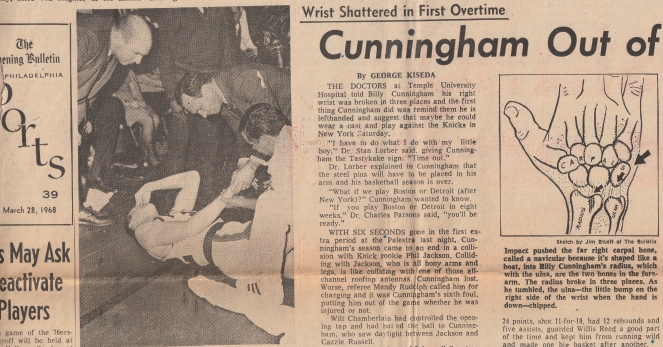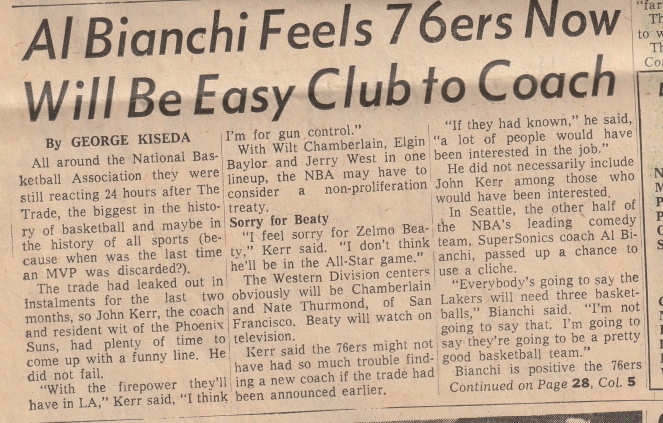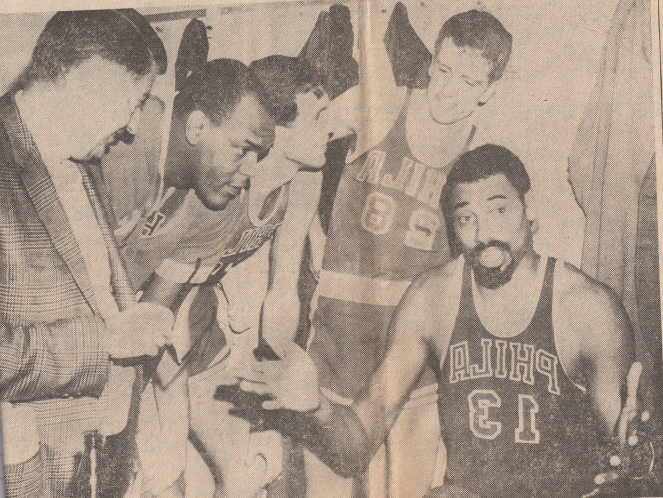
Since we’re all about finding games to play these days, board games aren’t the only way to have some fun, let’s play the what if game. It’s especially appropriate if we go back to this exact day in history in 1968 when it all started.
It’s the day the playoffs stopped, not for everyone the way it has today, just for Dad. He broke his wrist.

Here’s what Kiseda had to say:
THE DOCTORS at Temple University Hospital told Billy Cunningham his right wrist was broken in three places and the first thing Cunningham did was remind them he is left-handed and suggest that maybe he could wear a cast and play against the Knicks in New York Saturday.
“I have to do what I do with my little boy,” Dr. Stan Lorber said, giving Cunningham the Tastykake sign, “Time out.”
Dr. Lorber explained to Cunningham that the steel pins will have to be placed in his arm and his basketball session is over.
“What if we play Boston or Detroit (after New York)?” Cunningham wanted to know.
“If you play Boston or Detroit in eight weeks,” Dr. Charles Parsons said, “you’ll be ready.”
The Evening Bulletin, March 28, 1968
I just loved the Tastykake time out sign. I wonder if that was around when I was little, I don’t remember it. But anyway, Dad remembered the three steel pins sticking out of his hand and he couldn’t imagine what he was thinking wanting to play with the other hand. He was going through a bit of the Peter Pan Syndrome that we talked about last week, he was young and he thought the most important thing was to play ball. However, it did make him quite the weatherman–he could predict whether it was going to precipitate the following day.
I asked Dad how hard was it not to be able to play. It was a dumb question, knowing Dad, he’s not one to let pain get in his way, or anything, for that matter. He’s the only person I know who prefers to have an operation without anesthesia so he can drive himself home afterwards. He couldn’t have taken it lightly.
He said it was heartbreaking sitting on the bench, he just had to show up at a certain time, and do nothing. But it did bring up an interesting point, it got Dad to wonder what if.
What if gale-force winds hadn’t blown off a portion of the roof of the old Spectrum on South Broad Street and they didn’t need an alternate place to play that night? They played in the Palestra, where the University of Pennsylvania plays, only there’s no give to the floor. It’s a permanent floor laid over concrete. At the Spectrum, they put something over the ice, then they laid the floor so there was a bit of space between the floor and the ice, which gave it a trampoline effect with less bounce. “I might not have broken my wrist if we’d played at the Spectrum.”
What if he’d been able to play in the remainder of that playoff series? They would have still won against New York, like they did, but what if they could have beat Boston? They would have won the World Championship a second year in a row. “We were trying to repeat as World Champions. At the end of that year Wilt was traded to LA. “
What if Dad had been healthy and he’d been able to play and they had won, would Wilt have been traded? Would it have ended his career as a 76er?
There’s a bit of backstory here, Wilt was led to believe by Ike Richman, part owner of the 76ers along with Irving Kosloff, that he’d get a piece of ownership of the team; Ike died earlier that year and Kosloff wouldn’t honor the gentleman’s agreement. In other words, the trade was a disaster.

All around the National Basketball Association they were still reacting 24 hours after The Trade, the biggest in the history of basketball and maybe in the history of all sports (because when was the last time an MVP was discarded?)
The Evening Bulletin, July 11, 1968
I was really warming up to this sports reporter so I looked him up. Unfortunately he had died of dementia in 2007, and Dad said he was sorry to hear about that because he was such a brilliant, albeit opinionated, man. When I mentioned to Dad that I read that Kiseda was well loved, he laughed and said he wouldn’t know about that. George wasn’t afraid to speak his mind. He’d get in a precarious situation, and everyone else would have kept their mouth shut, but he’d stick his nose in anyway even if it got him into trouble.
So this is how the what if game started on this very day in history. What if we bring George Kiseda’s opinionated spirit back and play the what if game on this day in 2020, where might that lead us? Let’s turn to this week’s experts gathered by TEDConnects for daily conversations in their new Community and Hope series. I watched them all and then summed up each one as a what if statement.
Sandy David, Psychologist studying emotional agility, on March 23: What if we move away from our mind and into our hearts and come into our emotions, however scary they might be, and observe them for what they teach us about our values? In fact, having what Susan calls emotional agility can lead us to see beyond the soul and experience the person behind the person. It’s something we all need right now. https://youtu.be/Xgyh0juINNI
Bill Gates, the only guest who doesn’t need an introduction (according to head of TED Chris Anderson), on March 24: What if we go into Bill Gates mind and see the world working together through innovation and science? Early on he poured $100 million into his foundation to administer easy and cheap testing and develop vaccines. He says we must quarantine, there is no middle ground with this, we must quarantine now, but if we do it well, within 20 days we will see a difference, and within 6-10 weeks we could get somewhere. “The economic effects are drastic, but that’s more reversible than bringing people back to life.” https://youtu.be/Xe8fIjxicoo
Gary Liu, CEO of South China Morning Post, on March 25: What if we were to learn from Hong Kong’s example of the selflessness of their citizens (they have a social memory of SARS)? “My hope is that the citizens of the US take this seriously.” He said it doesn’t matter if you’re not sick, young, don’t fear dire consequences of death, if you’re possibly an asymptomatic carrier that’s enough to keep you at home. https://youtu.be/KIh2-S2jXls
Dr. Seth Berkley, CEO of GAVI, The Vaccine Alliance, on March 26: What if we prioritize health and support scientists and applaud politicians who are making tough decisions and doing good? With a united world and financial backing, science and technology can stop this and prepare for the next one. It typically takes 10-15 years to generate a vaccine and they are trying to accelerate this in 18 months. https://www.ted.com/talks/seth_berkley_the_quest_for_the_coronavirus_vaccine?utm_campaign=tedspread&utm_medium=referral&utm_source=tedcomshare
Priya Parker, Author The Art of Gathering, on March 27: What if we make meaningful gatherings within our family, social circles, community, our businesses and through our legislature (think of the purpose of town hall) now that we’re physically apart? If we decide what is essential now and think about how we gather, it will change from day to day and week to week, it will be contagious. Others will do this, too. We can do this. “We can shape our collective reality together.”
The pre-recorded video isn’t available at the time of this writing so I’m sending you to her website instead: https://www.priyaparker.com
So we played the what if game today, there’s something about March 27 that made us do it. We looked at the past and imagined if Wilt had stayed to play for the 76ers, the world would have played out a lot differently. And now we’re playing the game again on the same day in 2020. What if people actually listen to the experts and be the members of the community that we are meant to be?
What if…it’s a great game.


I like how you punctuate the what-if “turned around” theme with the Wilt clip at the top and then same photo reversed at the bottom!
That made me smile when I thought to do it. Glad you got to enjoy it, too!